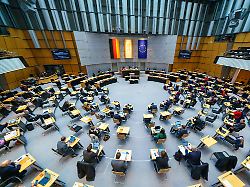Election to the House of Representatives
All data, all facts about the Berlin election
2/6/2023, 7:42 p.m
Re-election in the German capital: Which party will be the new strongest force in the Berlin House of Representatives? More than a year after the chaos vote in autumn 2021, around 2.5 million eligible voters will be able to cast their vote again next Sunday. The most important data at a glance.
Political decision in the direction of the state of Berlin: A few days before the election date on Sunday, February 12, according to surveys, there are signs of major shifts in the Berlin House of Representatives. The balance of power in the Berlin state parliament could change fundamentally in the course of the court-ordered repeat election.
The CDU, so far still in the opposition, is clearly ahead in the latest polls. According to a representative survey by the opinion research institute Forsa, the Christian Democrats, with their top candidate Kai Wegner, have around 26 percent. The CDU could thus emerge as the new strongest force in the repeat election and at the same time achieve its best result at the Berlin state level in a good eight years.
According to the Forsa survey, the second strongest force after the CDU would be the Greens, who achieved around 18 percent in the survey just under a week before the election date. Compared to the election result on the day of the chaos election of September 26, 2021, the Greens under top candidate Bettina Jarasch would only have to accept a slight loss of votes.
The Social Democrats, who are running for re-election with the previously governing mayor Franziska Giffey, currently only make it to 17 percent in the Forsa survey. That would be a significant crash: In autumn 2021, the SPD had won the election to the Berlin House of Representatives with 21.4 percent.
The pollsters also predict that the liberals will lose votes. According to a Forsa survey, the FDP can only count on around 5 percent of the votes in the capital. This puts the re-entry into the House of Representatives in question. In September 2021, the FDP was still 7.1 percent. Forsa sees the AfD as well as the CDU as politically on the rise in the state of Berlin. According to the survey, the alternative for Germany has good prospects of improving from 8 to around 10 percent.
Who will be politically at the helm in Berlin in the future is still completely open. A replacement of the previously governing red-green-red government coalition by a conceivable alliance between the CDU and the Greens seems questionable: In an interview with the “Tagesspiegel”, CDU top candidate Wegner indirectly spoke out against black-green cooperation.
Wegner justified this with plans by the Greens to want to remove half of the parking spaces in the capital – that was “a unilateral policy against the car,” said Wegner.
Note: All data, all facts about the Berlin House of Representatives election 2021 with the impressions of the election evening can be found here here.
Greens top candidate Jarasch reacted promptly to the statements of the Berlin CDU boss: “After rejecting a diverse city, the CDU is now also canceling the mobility turnaround,” said the transport senator. Jarasch had already been very critical of a possible coalition with the CDU at the beginning of January.
In the 2021 House of Representatives election, the SPD had achieved 21.4 percent. The Greens were in second place with 18.9 percent, followed by the CDU with 18.0 percent. At that time, the left received 14.1 percent, the AfD 8.0 and the FDP 7.1 percent.
Due to a series of problems and blatant errors in the September 26, 2021 election, the Berlin Constitutional Court ordered a complete rerun of the election. This will take place on February 12th.
